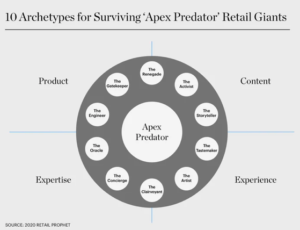Story
Marketing’s influence is not the goal, part 2


When marketers complain about the lack of influence at executive level they’re grabbing the wrong end of the stick. In the second article about Marketing’s influence within companies, I look at the importance of accountability and innovation.
My first article introduced a piece of research by Dutch marketing professors Peter C. Verhoef and Peter S. H. Leeflang from University of Groningen; “Understanding the Marketing Department’s Influence within the Firm”. The research concludes that:
- Marketing’s influence within companies is “moderate”,
- there are two main drivers of marketing’s influence,
- no positive link between marketing’s influence and business performance can be established.
In this article I will dive deeper into their findings. Why the troubling conclusion that marketing’s influence does not positively affect business performance? How might marketing counter this? And what are the implications for marketing departments for (re-)gaining influence?
Why the downward spiral?
For 10 to 20 years, marketing departments have generally experienced diminishing influence in the companies that they’re supposed help steer in an ever-more market- and customer-focused direction. As I see it, this decrease is largely due to three things:
- Many of the strategically important aspects of marketing are increasingly addressed by other functions in the organization, for example strategic planning, market research/analytics, digital, and new business development.
- Overall companies are becoming more market and customer-focused, meaning that marketing is now sharing the ’ownership’ of the customer with everyone in the company.
- Marketing leaders are not sufficiently on top of the growing importance of marketing operations, ie building and driving a highly-efficient marketing organization that is able to manage not only a globalized, multi-channel landscape but also change and ambiguity – all of this in a resource-effective way, employing data, systems, and processes that boost efficiency and bottom line.
The state of marketing’s influence
Marketing used to manage the strategic planning, new business development and all four Ps. However, the research finds that marketing today is mainly responsible for segmentation and positioning, customer satisfaction measurement and improvement, advertising, and relationship and loyalty programs.
Decisions about longer-term strategy or business development investments do not belong to marketing, and its influence on non-marketing decisions such as IT investments or changes is limited. My guess is that the latter is a source of great frustration for marketing leaders, given the demand for an increasingly digitally-based marketing approach. On this basis, the research concludes that marketing’s influence within companies is “moderate”.
There are slight variations, though. The research concludes that marketing has a greater struggle to influence companies that are focused on short-term results vs long-term goals; pursue a cost-leader strategy vs a differentiation strategy; and operate in B2B markets vs B2C.
Conversely, marketing has more influence in B2C companies with a long-term outlook pursuing a differentiation strategy. This supports my own experience: in corporations structured around brand management (for example P&G, Lego, some FMCGs), marketing often has responsibility for the P&L of the brand/business unit in question which of course implies a much broader responsibility and requires business skills covering most of the value chain.
Interestingly, according to the research, other key aspects like the CEO’s level of marketing background, the power of the company’s channel partners, or the degree of market turbulence has no effect on whether marketing is influential in a company or not.
Does marketing’s influence matter?
Troublingly, the research finds no evidence that a more influential marketing department directly contributes to better business performance.
This obviously begs the question why bother? Why worry about whether marketing’s influence is in a downward spiral when apparently it makes no difference for the business?
Here’s where the research results become a bit complex, but this is key: marketing is perceived as mainly responsible for the ability to link the company’s core offer to customer needs and vice versa.
Through this customer connection focus the marketing department plays a role in fostering and shaping a company’s market orientation. And the more market-orientated a company is, the stronger the business performance, according to the research.
So while marketing’s influence may not have a direct impact on business performance, through its customer connection and customer orientation marketing’s influence can have an indirect impact on business performance.
The upward spiral
But there’s more: the stronger marketing’s influence is, the more market oriented the company becomes, and the more its performance improves. Conversely, the more market-oriented a company is, the stronger marketing’s influence becomes. Which in turn fuels the company’s market orientation, which fuels the business performance. And so forth. The two reinforce each other.
In other words, marketing’s influence is only important as long as it helps boost a company’s market orientation. And in order to gain the influence to do that, only two things matter:
- Accountability: how well marketing is able to link marketing objectives and results with financial objectives and results.
- Ability to innovate: how well marketing is able to contribute to new products/service development.
Accountability
The importance of accountability should be no surprise to anyone anymore. Marketing has been criticized for years for not being sufficiently concerned with quantifiable ROI. Many marketing departments will require a financial behaviourial change and would therefore often need to build up capabilities in analytics, finance, and cost accounting – or at least work with external partners who can provide this excellence.
The research suggests a couple of concrete actions: marketing should insist on allocating adequate budget for measuring, tracking and testing; and marketing plans should always include a section with a financial forecast of the marketing actions, just like evaluations should always report on ROI along with performance metrics.
Ability to innovate
This is not the same as creativity. Creativity is defined as ‘finding new ways to market products/services’. Ability to innovate is ‘contributing to new product/service development’ – new stuff we can make money on – ie contribution to organic growth.
Here, the research suggests, marketing should capitalize more on its market and customer insight to help develop new customer and service concepts. Marketers should also be trained in methods to transform customer desires and needs into explicit products ideas. One might add that marketing should also seek to participate in NPD task forces, and proactively take the role as the insights specialist.
The real goal
When marketers complain about the lack of influence at executive level, not having a seat at the board of directors etc, they’re grabbing the wrong end of the stick. Marketing’s importance is not self-evident and there are no grounds for claiming its vital role for business performance. Only when marketing is able to increase a company’s market orientation does it play a part in this.
So marketing’s influence is not the goal. The goal is to ‘increase company’s market orientation’. Marketing influence is a means to achieve this goal. The seat at the executive table is not going to build the necessary influence. Increasing active use of financial metrics and contributing to the company’s organic growth is.
________________________________________________________________________________________
ARTICLE HIGHLIGHTS
- Marketing’s influence may not have a direct impact on business performance, but it can have an indirect impact through its customer connection and customer orientation.
- Marketing’s influence only matters if it is used to increase the company’s market orientation.
- Only two things count in boosting marketing’s influence: Accountability and the ability to innovate.
- When marketers complain about the lack of influence at executive level they’re grabbing the wrong end of the stick.
________________________________________________________________________________________
This article is featured at CMO.com.
And here is the first article.





